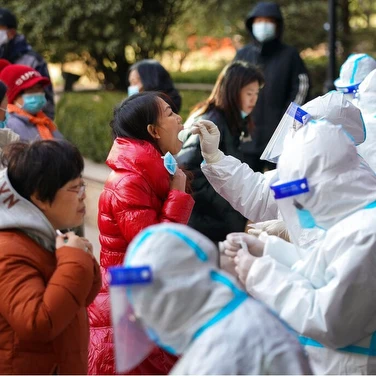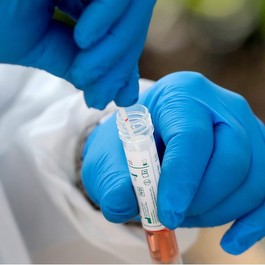Share your experience and help others understand the real-world benefits of following CLSI guidelines. Whether it's improved accuracy, enhanced efficiency, or better compliance, your story can inspire and guide fellow professionals. Submit your experience today and contribute to a global conversation on laboratory excellence!
Establishing International Standards in China
Overview
CLSI has a continuing role in supporting China’s steady improvement of the quality and capabilities of its medical laboratory infrastructure. The CLSI relationship with the People’s Republic of China (PRC) aligns with CLSI’s nonprofit mission to develop clinical and laboratory practices and promote their use worldwide. CLSI is proud of its continuing role in supporting China’s steady improvement of the quality and capabilities of its medical laboratory infrastructure.

Overview
CLSI has a continuing role in supporting China’s steady improvement of the quality and capabilities of its medical laboratory infrastructure. The CLSI relationship with the People’s Republic of China (PRC) aligns with CLSI’s nonprofit mission to develop clinical and laboratory practices and promote their use worldwide. CLSI is proud of its continuing role in supporting China’s steady improvement of the quality and capabilities of its medical laboratory infrastructure.
The Situation
Clinical and Laboratory Standards Institute (CLSI)’s relationship with the People’s Republic of China (PRC) began in 2012, at a time when China’s major national health care reform directives were being established. The need was recognized at this time for China’s laboratory medicine services to be elevated to meet international standards. As the globally recognized leader in medical standards, CLSI was a natural partner to provide technical support for the Chinese administration.
The Program
Key drivers for this relationship:
- PRC central and provincial government mandates for health care reform.
- PRC promotion and implementation of internationally accepted best-practice standards that could be readily adapted to local requirements.
- Increasing acceptance in the PRC that the field of laboratory medicine is essential for the diagnosis and treatment of all communicable and most noncommunicable diseases.
- Respected PRC academic and industry experts markedly increased their active engagement on the international standards development stage.
- The need for expedient training and implementation support to achieve accreditation aligned to internationally recognized standards.
CLSI’s portfolio of 200+ recognized international standards and major role in the International Organization for Standardization (ISO) and World Health Organization (WHO) activities led to the PRC seeking out CLSI as a key partner.
The relationships began in 2012, when CLSI’s president at the time, Dr. Mary Lou Gantzer, was invited to Beijing by Dr. Tony Chan, China State Standard Technical Committee for Clinical Laboratory Testing and In Vitro Diagnostic Test System (SAC/TC136) advisor, to provide the plenary session speech at the SAC/TC136 annual conference. Dr. Gantzer’s presentation and subsequent introductions to relevant leaders in China began a series of fruitful discussions and activities with members of academia, government, and the in vitro diagnostic industry.
In recent years, important successes between the PRC and CLSI include:
- Collaboration with academic leadership at Sun Yat-sen University (SYSU) and Zhongsan Medical School (ZMS) in Guangzhou and Shenzen University (SZU) in Shenzen, to conduct strategy sessions, provide lectures by international experts, create a model community-based medicine program, and advance laboratory medicine curriculum at the university.
- Development of a new four-year academic degree program at NanFang College of SYSU beginning in 2016, including dedicated academic professional support from CLSI.
- CLSI assistance in coordinating guest speaking engagements from renowned international laboratory experts for the national societies of the Chinese Medical Association (CMA) and related conferences.

The Results
This multi-year program and collaboration has contributed to many significant outcomes including:
- Creation and implementation of the Community-Based Clinical Laboratory Quality Management Enrichment Program, which can be replicated on a larger scale.
- Creation of a quality operations checklist based on the international standard ISO 15189 and CLSI’s quality management system checklist derived from its global training activities in 22 countries, and in alignment with the Chinese National Accreditation Service (CNAS) requirements.
- Training of a core cadre of local experts to audit, assess, and improve the quality of operations at Tier One and Two hospitals and health care centers using a training-of-trainers model.
- Coordination of local support by YunKang’ s laboratory experts and support for the CHC’s training for and implementation of a quality management system, logistics (couriers and specimen transport), reference testing, remote quality control monitoring, information technology support, equipment selection, personnel training, and accreditation preparedness.
- Selective translation into Mandarin of essential standards, guidelines, and job aids.
- Direct observation and gap assessments using a locally adapted checklist form, with easily observable improvements of nonconformances after training and support.
- The CLSI/PRC relationship demonstrates the value of partnerships in alignment with CLSI’s nonprofit mission to develop clinical and laboratory practices and promote their use worldwide.
Share Your Experience with CLSI Standards in your Laboratory
